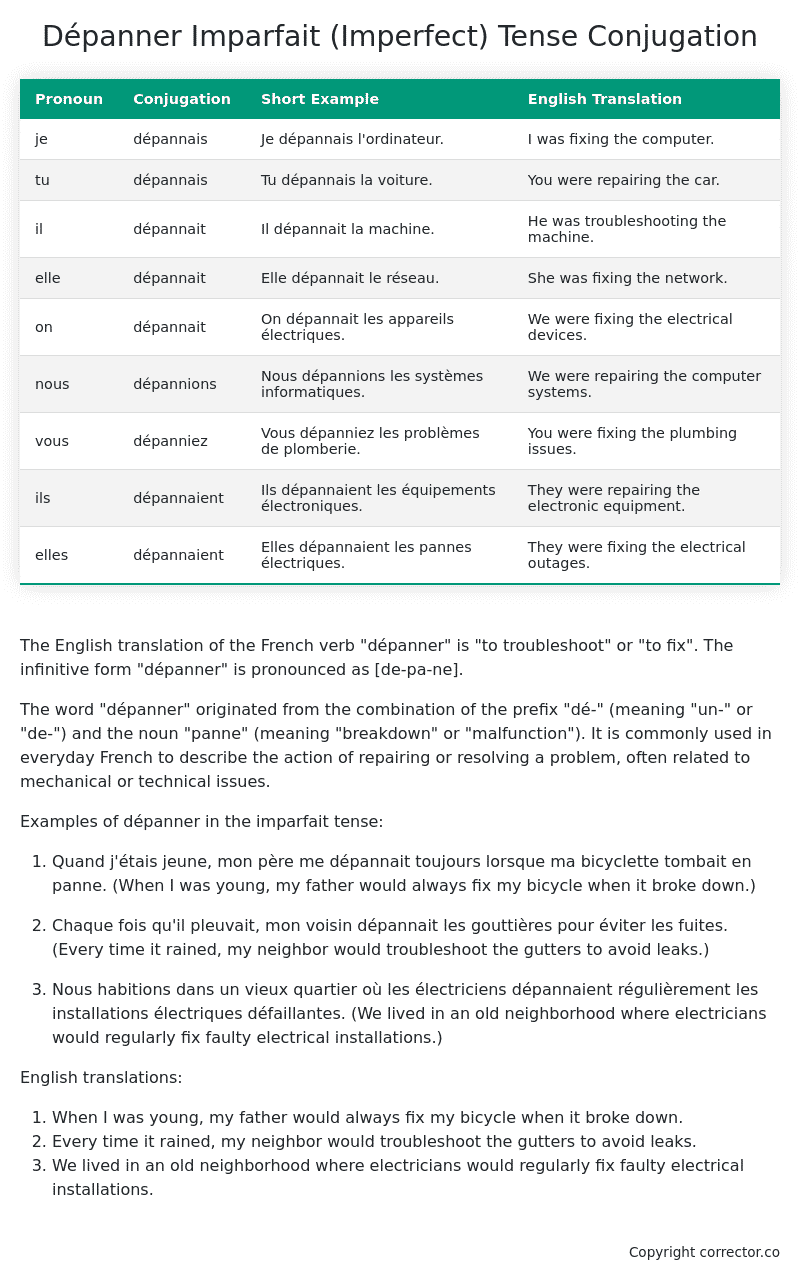Imparfait (Imperfect) Tense Conjugation of the French Verb dépanner
Introduction to the verb dépanner
The English translation of the French verb “dépanner” is “to troubleshoot” or “to fix”. The infinitive form “dépanner” is pronounced as [de-pa-ne].
The word “dépanner” originated from the combination of the prefix “dé-” (meaning “un-” or “de-“) and the noun “panne” (meaning “breakdown” or “malfunction”). It is commonly used in everyday French to describe the action of repairing or resolving a problem, often related to mechanical or technical issues.
Examples of dépanner in the imparfait tense:
-
Quand j’étais jeune, mon père me dépannait toujours lorsque ma bicyclette tombait en panne.
(When I was young, my father would always fix my bicycle when it broke down.) -
Chaque fois qu’il pleuvait, mon voisin dépannait les gouttières pour éviter les fuites.
(Every time it rained, my neighbor would troubleshoot the gutters to avoid leaks.) -
Nous habitions dans un vieux quartier où les électriciens dépannaient régulièrement les installations électriques défaillantes.
(We lived in an old neighborhood where electricians would regularly fix faulty electrical installations.)
English translations:
- When I was young, my father would always fix my bicycle when it broke down.
- Every time it rained, my neighbor would troubleshoot the gutters to avoid leaks.
- We lived in an old neighborhood where electricians would regularly fix faulty electrical installations.
Table of the Imparfait (Imperfect) Tense Conjugation of dépanner
| Pronoun | Conjugation | Short Example | English Translation |
|---|---|---|---|
| je | dépannais | Je dépannais l’ordinateur. | I was fixing the computer. |
| tu | dépannais | Tu dépannais la voiture. | You were repairing the car. |
| il | dépannait | Il dépannait la machine. | He was troubleshooting the machine. |
| elle | dépannait | Elle dépannait le réseau. | She was fixing the network. |
| on | dépannait | On dépannait les appareils électriques. | We were fixing the electrical devices. |
| nous | dépannions | Nous dépannions les systèmes informatiques. | We were repairing the computer systems. |
| vous | dépanniez | Vous dépanniez les problèmes de plomberie. | You were fixing the plumbing issues. |
| ils | dépannaient | Ils dépannaient les équipements électroniques. | They were repairing the electronic equipment. |
| elles | dépannaient | Elles dépannaient les pannes électriques. | They were fixing the electrical outages. |
Other Conjugations for Dépanner.
Le Present (Present Tense) Conjugation of the French Verb dépanner
Imparfait (Imperfect) Tense Conjugation of the French Verb dépanner (You’re reading it right now!)
Passé Simple (Simple Past) Tense Conjugation of the French Verb dépanner
Passé Composé (Present Perfect) Tense Conjugation of the French Verb dépanner
Futur Simple (Simple Future) Tense Conjugation of the French Verb dépanner
Futur Proche (Near Future) Tense Conjugation of the French Verb dépanner
Plus-que-parfait (Pluperfect) Tense Conjugation of the French Verb dépanner
Passé Antérieur (Past Anterior) Tense Conjugation of the French Verb dépanner
Futur Antérieur (Future Anterior) Tense Conjugation of the French Verb dépanner
Subjonctif Présent (Subjunctive Present) Tense Conjugation of the French Verb dépanner
Subjonctif Passé (Subjunctive Past) Tense Conjugation of the French Verb dépanner
Subjonctif Imparfait (Subjunctive Imperfect) Tense Conjugation of the French Verb dépanner
Subjonctif Plus-que-parfait (Subjunctive Pluperfect) Tense Conjugation of the French Verb dépanner
Conditionnel Présent (Conditional Present) Tense Conjugation of the French Verb dépanner
Conditionnel Passé (Conditional Past) Tense Conjugation of the French Verb dépanner
Conditionnel Passé II (Conditional Past II) Tense Conjugation of the French Verb dépanner
L’impératif Présent (Imperative Present) Tense Conjugation of the French Verb dépanner
L’impératif Passé (Imperative Past) Tense Conjugation of the French Verb dépanner
L’infinitif Présent (Infinitive Present) Tense Conjugation of the French Verb dépanner
L’infinitif Passé (Infinitive Past) Tense Conjugation of the French Verb dépanner
Le Participe Présent (Present Participle) Tense Conjugation of the French Verb dépanner
Le Participe Passé (Past Participle) Tense Conjugation of the French Verb dépanner
Struggling with French verbs or the language in general? Why not use our free French Grammar Checker – no registration required!
Get a FREE Download Study Sheet of this Conjugation 🔥
Simply right click the image below, click “save image” and get your free reference for the dépanner imparfait tense conjugation!

Dépanner – About the French Imparfait Tense
NOTE: To take a deep dive into all the French tenses then see our article on Mastering French Tense Conjugation.
Formation of the Imparfait Tense
For regular -er verbs:
For regular -ir verbs
For regular -re verbs
Common Everyday Usage Patterns
Description of Past Habits
Background Information
Mental and Emotional States
It’s employed to express emotions, thoughts, or physical sensations in the past. For example: “J’étais content quand il est arrivé.” (I was happy when he arrived.)
Ongoing Actions
Points to Note About the Imparfait Tense
Passé Composé vs. Imparfait
Conditional
Si Clauses
Narration
I hope you enjoyed this article on the verb dépanner. Still in a learning mood? Check out another TOTALLY random French verb imparfait conjugation!


